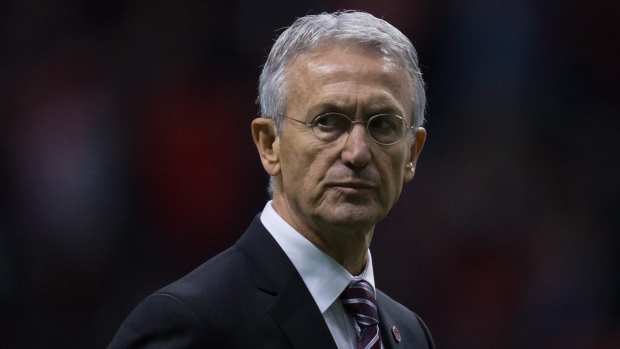Sep 15, 2016
Inside Floro’s tenure with Canada's men’s team
Meticulous manager developed a large talent pool of players, but Benito Floro needed to trust in his squad members when injuries, fitness and form issues came up, Terry Dunfield writes.

Benito Floro took the reins of the national team during a difficult period in Canadian men’s soccer. Confidence was at an all-time low following the infamous 8-1 hammering in Honduras and we were entering a transition period. Canadian veterans Dwayne De Rosario, Kevin McKenna, Paul Stalteri, Patrice Bernier, Julian de Guzman, Ante Jazic, Michael Klukowski, and I were all well into our 30s.
I was a member of Floro’s squad for his first four games in charge. Benito earned instant respect from the players, having managed European super club Real Madrid — or was it from the Maybach baseball cap he wore with his training kit? Could someone finally have a nicer car than de Guzman?
Benito was meticulous about everything he did. The freedom the players had under previous regimes was cut significantly. We had meetings about meetings. He absorbed everything; whether it was training, how you interacted within the group or what you were eating.
Benito tried to implement a high-pressing and attacking 4-4-1-1 formation similar to the one Iceland deployed so successfully at Euro 2016. But one win in his first 12 matches lead him to deviate from his original philosophy and introduce a holding midfielder.
A combination of a good performance against Columbia and two defeats in the next 15 games lifted hopes around camp. Benito saw this as licence to change Canada’s DNA on the fly ahead of the World Cup qualification campaign. Les Rouges were now a counter-attacking team, placing greater emphasis on set pieces and building around two gifted players in Atiba Hutchinson and Junior Hoilett. This showed flexibility, but I would guess it was different from what he promised the Canadian Soccer Association (CSA) when he took over.
A fantastic win over Honduras at BC Place last November and everything over the past 26 months was swept under the carpet. There was reason for optimism as the team travelled to El Salvador for a must-win game four days later. For me, Benito set the team up too cautiously against a depleted opponent. The issue was highlighted by his first two subs with the match tied 0-0, when defensive midfielder Samuel Piette and centre-back David Edgar entered the game. Rather predictably, the score was unchanged when the final whistle sounded.
In the next competitive outing in March, it seemed like Benito tried to go toe-to-toe with Mexico at their game. Canada were comfortably beaten 3-0 on home soil, and in the following two matches — against Mexico again and Honduras — we were simply outplayed.
With a slight mathematical chance of progression into the Hex stage of qualifying, the team performed heroically and beat El Salvador 3-1 at BC Place, but it was not enough to progress. A week later, Floro and the CSA went their separate ways.
Positives
Benito is a true gentleman. His morals and beliefs made the players better human beings. Tactically he was very astute; every set piece had six or seven variations. He was not scared to give players an opportunity, and developed a large talent pool of players. He watched all the players’ club games and compiled DVDs as aids to improve individual performances at club level. With the help of CSA president Victor Montagliani, Hoilett and Scott Arfield committed to Canada during his term.
Negatives
When Benito first took over he could not speak English, which was a similar situation to the language barrier I experienced at Toronto FC under Aron Winter. Sometimes information was lost in transition as Benito tried to explain his methods, although I was told communication improved after my days were over. There were too many training camps in Europe. The players needed more experience playing in Central America and the Caribbean, especially closer to World Cup qualifiers. The increasing fluidity in Benito’s system unfortunately meant too many players were played out of their natural positions. He needed to trust in his squad members when injuries, fitness and form issues came up.
Moving Forward
The next manager to take the helm needs to embrace Canada’s strengths of togetherness, work ethic and athleticism. We need an identity that every player buys into and is able to execute. CONCACAF or MLS experience is mandatory. International experience, as a player or coach, would be a bonus.
TSN soccer analyst Terry Dunfield was a professional soccer player for more than 17 years. He started his career at Manchester City, making his EPL debut at 19. After 13 years in England, Terry returned to Canada to play in the MLS for the Vancouver Whitecaps and Toronto FC. He was a member of Canada's national soccer team throughout his career.
